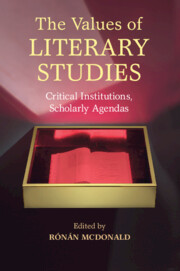Book contents
- Frontmatter
- Contents
- Notes on Contributors
- Acknowledgments
- Introduction
- 1 The Value of Criticism and the Project of Modernism
- 2 Caprice: Individual Subjectivity in Literary Criticism
- 3 The Phenomenology of Literary Valuation
- 4 Literature Is History: Aesthetic Time and the Ethics of Literary Will
- 5 Dead on Arrival: Time and the Value of Old Books
- 6 The Price of Value
- 7 To Shelter the Nothing That Happens
- 8 When Literary Criticism Mattered
- 9 Literature among the Objects of Modernist Criticism: Value, Medium, Genre
- 10 “Vale!” : Psychoanalysis, Value, and Literature
- 11 Afterlives of Comparison: Literature, Equivalence, Value
- 12 Feminism, Gender, and the Literary Commons
- 13 The Value of World Making in Global Literary Studies
- 14 Multiple Versions and Fictional Minds: Manuscript Research, Digital Editing, and Enactive Cognition in Literary Studies
- 15 After Suspicion: Surface, Method, Value
- 16 Literary Experience and the Value of Criticism
- Index
Introduction
Published online by Cambridge University Press: 05 November 2015
- Frontmatter
- Contents
- Notes on Contributors
- Acknowledgments
- Introduction
- 1 The Value of Criticism and the Project of Modernism
- 2 Caprice: Individual Subjectivity in Literary Criticism
- 3 The Phenomenology of Literary Valuation
- 4 Literature Is History: Aesthetic Time and the Ethics of Literary Will
- 5 Dead on Arrival: Time and the Value of Old Books
- 6 The Price of Value
- 7 To Shelter the Nothing That Happens
- 8 When Literary Criticism Mattered
- 9 Literature among the Objects of Modernist Criticism: Value, Medium, Genre
- 10 “Vale!” : Psychoanalysis, Value, and Literature
- 11 Afterlives of Comparison: Literature, Equivalence, Value
- 12 Feminism, Gender, and the Literary Commons
- 13 The Value of World Making in Global Literary Studies
- 14 Multiple Versions and Fictional Minds: Manuscript Research, Digital Editing, and Enactive Cognition in Literary Studies
- 15 After Suspicion: Surface, Method, Value
- 16 Literary Experience and the Value of Criticism
- Index
Summary
You cannot lead people to what is good; you can only lead them to some place or other. The good is outside the space of facts.
In the preface to his 1904 play John Bull's Other Island, George Bernard Shaw remarks that a healthy man is unconscious of the working of his bones until he breaks one. Then he thinks of little else but having it set. In that respect, the recent soul searching and self-scrutiny in the humanities is a symptom of the malaise that afflicts them. The humanities have become self-reflexive because they are under threat, blocked, and queried by neoliberal, econometric ideologies of higher education. When the value of something is self-evident and secure, it needs no audit or intellectual justification. We do not have collections of scholarly essays or polemical pamphlets on the importance of research into leukemia or waste-free nuclear fission. But professors in the liberal arts have responded to the cold eye of policy makers, government officials, and prospective students, with books, articles, conferences, and opinion pieces arguing for the contribution that research and teaching in humanities makes to society, or offering jeremiads that this social good is not sufficiently registered by econometric measures.
To compete in a global economy, policy makers urge, students need to be prepared for the workforce, well grounded in scientific and technological subjects, if not acquitted in directly vocational or professional degrees. Economies, it seems obvious, will benefit more from research on optic fibers and telecommunications than debates about neoclassical prosody and the modernist novel. Politicians have increasingly been explicit about this preference for “useful” degrees like science and engineering rather than arts or humanities, much to the chagrin of the professors of English or history. When they then protest about how crucial their role is, these academics often speak to external audiences, to policy makers, politicians, or parents. Certainly, extramural communication is essential for all academic disciplines, not least to avoid the danger of narcissism and isolation, and it can be beneficial for any enterprise to take stock of its point and purpose occasionally. Yet the imperative to articulate the value of the humanities in language that is at once clear enough for the nonspecialist and brief enough for the newspaper can push sophisticated scholars into simplistic polemics and apologias.
- Type
- Chapter
- Information
- The Values of Literary StudiesCritical Institutions, Scholarly Agendas, pp. 1 - 12Publisher: Cambridge University PressPrint publication year: 2015
- 1
- Cited by



